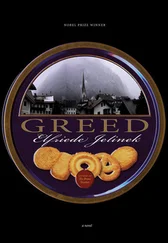At the very last moment the patricide plus suicide is aborted. One is too much of a coward to put a premature end to one's own life, there is too much still ahead of one. Which is invariably a mistake, but you believe it anyway and that is what counts. Rainer sits on the shoreline, white as a ghost and trembling. He gets a clip round the ear and says: I only wanted to give you a fright, I knew exactly when to brake, I'm a good driver, Papa. Did I alarm you? And what if the brakes had failed, huh? Another blow, one to the right and one to the left. Dad practically wet himself, luckily he managed to hold back. But he's got to relieve himself, urgently, thanks to the beer. Rainer, still weak from his intent to kill, has to drag his beer-bloated Papa to the edge of the forest, where the latter wants to have a piss. By way of punishment and revenge he insists that the lad support him the whole time while he's about it and admire his prick. How big it is. And back there Rainer saw how big it was then. There, that's that.
They turn slowly and carefully (the cri-sis having been overcome for today) and drive back to the city. The woods protest, they'd have liked to see more of these two, they very nearly got to keep them altogether. But as it is Papa keeps Rainer and Rainer keeps Papa.
THE JORGER BATHS provide a strong contrast. In the first place a contrast to the woods, where Rainer was recently and where Man has not yet won the struggle against Nature- 'the dark green, mighty forest and tough grey granite have shaped the destiny of these parts, and the deep gorges and vast plateaux have a sparse, stern beauty all their own. The impressions of these dark, silent forests have borne fruit in many who have succeeded in penetrating the defences of that formidable beauty.' The parental flat, which the Jorger Baths also provide a contrast with, is totally different. There is no liberty there, no clear open spaces like in the woods. Instead, the walls are gradually becoming smothered in complete gloom. There is no blue sky to be seen, nor any mysterious dark lakes embedded anywhere. The gloom is located in countless washpowder packs, old suit-cases, crates and boxes, stacked up to the ceiling, which have absorbed the horror of an unimportant bourgeois household (far too small for four people) over the years and are now generously pouring the aforesaid horror back out over the adolescents. All you have to do is lift any lid, at random, and out wells the fug and does its fuggy job. Nothing is thrown away, everything has to be kept to mark its own filth and that of the owners. Yellowed articles of clothing, broken crockery, children's toys, sporting equipment, souvenirs of the remoter parts of the country, papers, heirlooms, sundry apparatus for various activities, and in among the lot the yellowed, broken lives of four people, two adults and two adolescents. Rainer wants to raise himself up to the light, no matter where, in a wide-open landscape or a brighter flat with no clutter, if possible, except for tubular steel and glass; but to reach the light he has to leave the house, because inside there isn't any. You can't even breathe in and out freely because even the air is in short supply. And young people need air especially in order to grow to their intended physical proportions. But you can create your own light if none is available. To this end, Rainer often tells the others at school that his father drives an E-type Jaguar and has often taken planes abroad, which is all lies. His father, for his part, claimed in front of witnesses that the well-known pop singer Freddy Quinn was his illegitimate son and that he had had to pay maintenance on his account for a long time. This is also untrue. No matter how often Rainer parrots the story, it still isn't the truth.
What is down at the bottom on those endless white tiles across which the light glides in shimmering streaks? Not the ultimate and universal Truth which the adolescent seeks in his spare time when he has nothing better to do. What is down there at the cool bottom is water. As is water's way, it makes a blue and transparent overall impression, which is only occasionally blurred when there are too many waves, which is sometimes the case with Truth, too. Everything conduces to smoothness. No trace of roughness can be felt. Sophie too conduces to smoothness, among people. The smoothness is deep at one end and far shallower at the other, which is intended for non-swimmers. The pool attendant's whistle is shrill. The springboard springs with a creak. Muted cries call out, you can't tell where they come from or where they're directed, in this vast, echoing hollow vessel you cannot pinpoint sound. High above is the glass cupola. Up there, that is where Rainer wants to be, looking down on the youngsters splashing each other, but where is he in fact? Down below. And alas, he is a poor swimmer.
But you have to conceal the fact that you're a poor swimmer, are afraid of water that's too deep, and therefore tend to stay in the shallow end. This doesn't suit the image of someone such as himself who is always going deep down into things. Here, he can't get deep down. He is out of his element, though most elements are his. Anna and Rainer go through a lot of motions intended to show that they are good swimmers. But they're not. Splashing and spraying a good deal, they fling themselves into the one metre-deep water where you can stand, and try to make it look dangerous. The green over there, the sheer mystery of four vertical metres of water, fills them with a horror that could not be any greater if they were able to look right inside themselves. The cleanliness is enjoyable, heightened by the intense stench of chlorine, which declares: I kill off every single one of the bacilli and germs in here. Unfortunately I have to leave stray sperm and urine to the filter. Nor can I penetrate under the skin to kill off the hatred and nausea felt by these young people. The water slops about within the ceramic bounds intended for it and cannot quit its confines. Just as you cannot quit your own skin. Lots of people are giggling, laughing, shouting, squealing and doing sporty things. Some of them take weirdly contorted dives onto innocent swimmers, others dolphin about elegantly and skilfully. Anna and Rainer are not of the latter party. For them, being expected to perform something they can't do better than everyone else is awful. So they pretend. But all too frequently they have to make way, either down below when someone slips through, eel-like, or up above when someone threatens to leap onto their heads. Make way for the ones that can do it properly, is the plucky swimmers' motto, and they swim pluckily, so that the twins necessarily get left behind, because their territory is the world of the book, which is not in demand here and has neither a seat nor a vote, only trained athletes are wanted: to be precise-expert swimmers. Which is unfair, because these values are in fact worth least of all. Physique also has a value here. Above and below. More up above in the case of women and down below in the case of men. Both are developed as you might expect, given the ages of these youngsters, that is to say: the twins are on the under-developed side. We are referring, of course, to Rainer's and Anna's primary and secondary sexual features, which are more in evidence here than beneath their everyday clothing. In both his case and hers they are on the stunted side.
As if in a hurricane they cling to each other, brother and sister, and spit venom at a muscular show-off who has no idea who Sartre and Camus are or where they live (France).
At the opposite end, the deep end, Sophie, much to Rainer's displeasure, does the crawl in an immaculate white bikini which conceals a good deal but, alas, still displays a fair amount which belongs to Rainer alone. Sophie swims with style, her hair is concealed by a bathing cap, and she practises without over-zealousness because if you're that good you don't need to be over-zealous. She is here on a purely private basis. Clearly she has completely forgotten Rainer's presence, in spite of the fact that that presence ought to be both a constant threat and a challenge, not to give of her sporting best but to work on their private relationship and improve it. Taut as a bow, her body slides out of and back into the cold green water, which is known as the watery element. If something tenses, people say it tenses like a bow, but Sophie tenses her body as only Sophie can and not any two-bit bow and arrow. A gleaming opened safety pin sticking into a plastic skin. Without leaving the slightest trace of a prick. Sophie merely pricks Rainer's heart and Anna's mind, because she is weightless, only her horse knows her true weight because it often has to bear it. But no one has ever heard Tertschi, the horse, groan beneath it either.
Читать дальше












